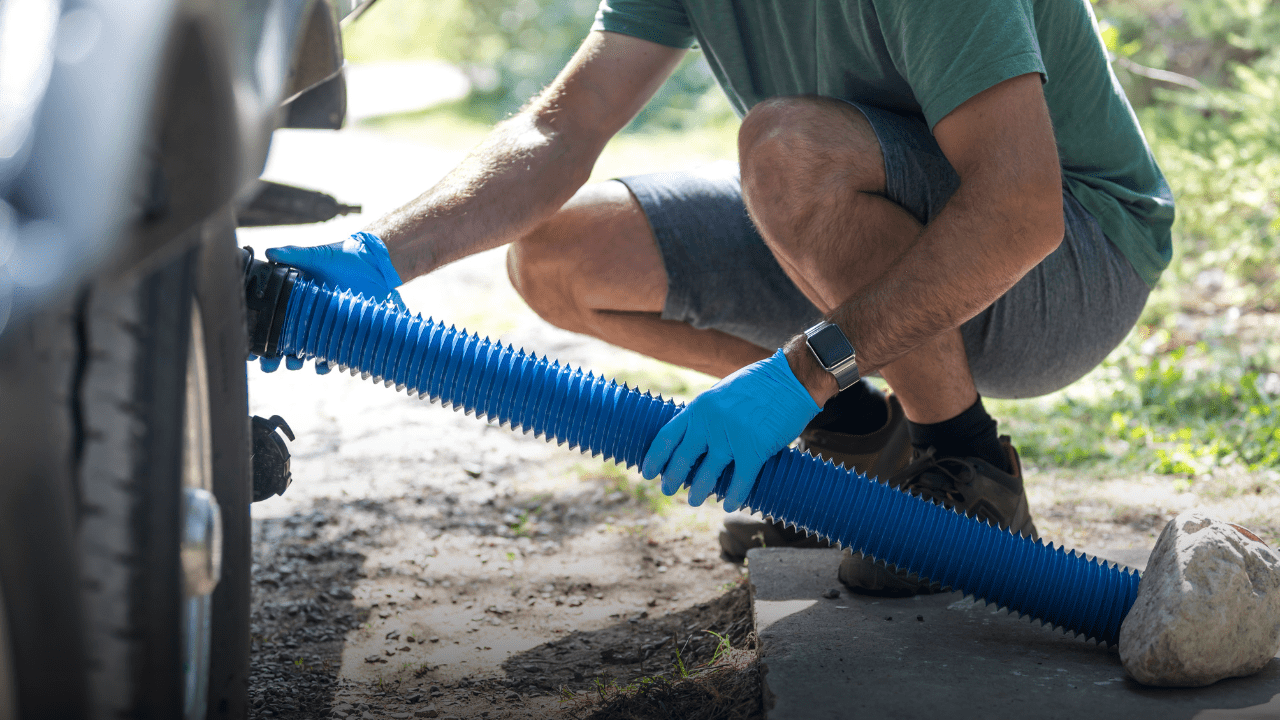Black tank issues are one of the fastest ways to ruin a trip. And almost all of them are avoidable!
Fortunately, you don’t need to overthink it. Stick to these five “golden” rules, and you’ll avoid nearly every common problem RVers face with their black tank.
1. Keep the black tank valve closed unless dumping
The black tank valve should always stay closed while camping, even if you’re connected to a sewer hookup. Opening it and leaving it open allows liquid waste to drain out while solids collect on the bottom. This can quickly lead to a blockage, the infamous poop pyramid, that’s difficult to fix. Keeping the valve shut gives waste time to break down in water, and helps everything flow out together when it’s time to dump.
2. Dump when the tank is about two-thirds full
Waiting until the tank is about two-thirds to three-quarters full before dumping creates the right amount of pressure to flush waste out completely. Dumping too early reduces flow, which can leave solids behind. If you’re preparing to travel and the tank isn’t full enough, you can add water manually to reach the right level.
3. Use plenty of water when flushing
Water keeps things moving. Each time you flush, especially after solids, hold the pedal down long enough to send a generous amount of water into the tank. This helps waste reach the tank cleanly and reduces buildup. Pre-filling the toilet bowl before use can also help waste slide down instead of sticking to the sides.
If you frequently have guests in your RV, hang a sign in the bathroom with these important steps to help reduce the chances of any issues arising.
4. Rinse the tank after dumping
After dumping the black tank, rinsing it helps clear out anything left behind. Waste residue can cause odors and make tank sensors inaccurate over time. Many RVs have a built-in tank flush connection for this, but if yours doesn’t, you can use a dedicated hose or tank wand through the toilet. Rinsing doesn’t take long, and it makes a big difference in keeping the tank cleaner.
5. Keep a few inches of water in the toilet bowl
Leaving water in the toilet bowl after each flush does two things: it blocks odors from rising up and keeps the rubber seal from drying out. That seal is what prevents tank gases from entering your RV and also stops leaks. If your toilet bowl looks dry, just hold the pedal slightly to refill it before walking away.
Optional: Use a quality black tank treatment
Some RVers regularly use black tank treatments to help control odor and assist in breaking down waste. Others prefer not to, especially if they already follow proper flushing habits and use enough water.
If you do choose to use one, look for an enzyme-based or bacteria-based formula instead of harsh chemicals. These are generally considered safer for both your tank components and campground septic systems. Like many RV habits, this one often comes down to personal experience and what works best for your setup.

I regularly follow numbers 3 and 5, obviously not having read these before, by instinct. However my wife has questioned my sanity in this regard.
As for number the “optional use of treatments”, I have tried everything from, to my mind, the most expensive to the regular, NONE of them seem to eliminate the smell completely. So with 9 years of fulltime RVing, I have settled on Walex pouches as being the most effective.
Thanks for sharing your experience! I use Happy Campers, but I did see Walex on the 10 most popular RV acessories on Amazon list (https://camperfaqs.com/most-popular-rv-accessories) and have been meaning to give them a try.
Hi Tori, amongst the “expensive” products I tried was the much vaunted Happy Camper, but it didn’t work for us. When we emptied the tub, we didn’t replace it.
Tried Happy Camper?
Item 4 is pointless. There are so many people that are hung up on cleaning their tank. It’s absurd. The tank is only clean till the first time you use it. The smell is gonna be the same whether you have one poop in it or 100. I have owned an RV since 1978 and have never use tank treatments or commonly flushed the tanks between usage. The only time I clean my black tank is when I have to work on it, like changing a gate valve. For all of those people that clean their tanks to get the sensors to work. Give it up. Just get external sensors and you’ll never have to worry about them again.
External sensors? More info please